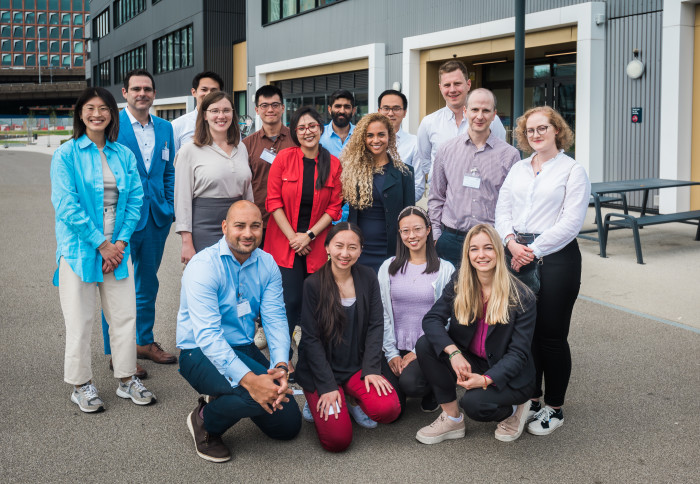Medtech accelerator showcases music therapy, organ mimicry and other innovations
by Ashley Mah

MTSC cohort 5
Ventures from Imperial-led entrepreneurship programme MedTech SuperConnector pitched medical technologies to industry experts at the cohort showcase.
MedTech SuperConnector (MTSC), an entrepreneurial skills development programme for early-career researchers at eight London institutions, hosted its first in-person Showcase in over two years at Scale Space White City this June. This concluding event of the six-month programme offered investors and experts the chance to hear directly from the researchers about their early-stage medical technologies.
The cohort featured 12 early-career researchers representing five of the eight MTSC partner institutions. They presented a variety of technologies, including diagnostics, drug discovery, surgical aids, music therapy, and wearables.
Across institutions there are researchers working on insightful research with the potential to solve real-world problems, however, the process of translating research into innovative technologies can be difficult.
From research to entrepreneurship
Entrepreneurial researchers have a wealth of knowledge and experience to support the science behind their innovation, however, they may benefit refining their business model and gaining a more thorough understanding of entrepreneurial skills.
MTSC stands apart from other accelerator programmes because of its focus on supporting researchers who are in the pre-tech transfer stage of the innovation pathway. In addition to funding, MTSC promotes entrepreneurial skill building through hosting a suite of masterclasses which cover topics from regulatory strategy, intellectual property, customer discovery and more.
Over 70 researchers have been supported through the past five cohorts, with more than £17 million raised in venture capital and grants. There have been 14 startups formed, resulting in more than 46 people employed. Some ventures have also seen the commercial launch of their first products, such as a wearable stimulation device for those living Parkinson’s from Charco Neurotech and Scaled, offering a wearable technology aimed at preventing joint injury.
Meeting the latest cohort
At the fifth cohort Showcase, the innovators engaged and informed the audience with their final pitches. Some saw their ventures change significantly from what they entered the programme with while others were able to identify their market and refine their business model. The pitches presented a brief insight into the journey each innovator had while on the programme, here’s what else some of them had to say about their time as an MTSC participant:
- 2Viz A sensor, developed as a surgical aid, that autonomously identifies and generates digital 3D maps of different tissues. Stephen Laws, an Imperial PhD candidate, joined the SuperConnector with an idea and preliminary lab studies. He saw his venture change drastically throughout the programme “…by the end…I had developed a full prototype, a well-defined customer segment, a business plan and clinical studies lined up to prove my technology”.
- EnMuAble A digital musical instrument to support collaborative music making and social interaction. Gigi Lam, a musician-educator from the Royal College of Music, said the programme provided her with a “supportive community, and lots of resources and training” that is preparing her to take her venture to the next stage.
- Zyme Dx Dr Leah Frenette works as a research associate at Imperial. Her venture, Zyme Dx, focuses on offering rapid diagnostic tests. Her participation in MTSC came at a useful time she says: “our venture was gaining traction but I wasn’t sure I was ready to take a major role in it." In addition to providing tools which allowed Frenette to gain confidence in her abilities to lead in a business setting, she says that MTSC also helped “focus our story and refine it to something nearly unrecognisable from when we began”.
- Smart Surgical Solutions MARIO – Mobile Assisted Reconstruction in Orthopaedics – is a smartphone enabled navigation tool to assist surgeons in placing orthopaedic implants precisely. Dr Shuqiao Xie, co-founder of Smart Surgical Solutions and an Imperial research associate in the Department of Bioengineering, said that he gained a clearer understanding of the market and where MARIO sits in it. With the support of MTSC he was able to update his business plan and pitch deck. The financial support also allowed he and his team register their company in preparation for the spinout process which he says “is not generally supported by any other translation programme.”
- NOAH Analytics Sigourney Waibel, a PhD candidate working at the Brain Sciences Division of the Department of Medicine at Imperial, applied for MTSC in order to help translate the technology built by herself and her team – an AI-enabled wearable device used to monitor patient behaviour in hospitals and care homes. She says that “the funding and 1:1 expert support helped us to build a robust business case around a strong core product and team” which is strengthening the foundation for “a sustainable healthtech startup”.
The cohort leave the programme with the confidence to regard themselves as innovators as well as researchers. Hiten Thrakar, Head of MedTech SuperConnector, said: “It’s great to finally be back in person, and give this cohort the opportunity to pitch and present to a room full with people from all corners of our ecosystem – startups, mentors, industry and funders. They’ve been through an intense six month period of pushing themselves in an area they’re not familiar with, developing new skills, applying them to their technologies and iterating as they go. I’m really excited to see how they get on, and where this takes them, on the next step of your entrepreneurial journey.”
Article text (excluding photos or graphics) © Imperial College London.
Photos and graphics subject to third party copyright used with permission or © Imperial College London.
Reporter
Ashley Mah
Enterprise




